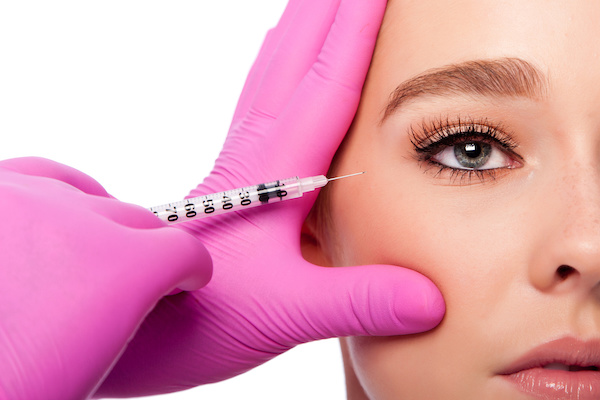In recent years, achieving a well-defined jawline has become a significant beauty goal for many. With advancements in cosmetic procedures, non-surgical options like jawline fillers have gained popularity due to their less invasive nature than surgical jawline contouring. At La Belle Vie Plastic Surgery, we use high-quality products like Juvederm to help you achieve the…
A man’s masculinity can be questioned when he develops enlarged or swollen breasts. Gynecomastia, a condition characterized by the enlargement of the breast tissue in a male’s chest, is a prevalent medical condition affecting many men. While not a serious health threat, gynecomastia may cause emotional distress, low self-esteem, and embarrassment in some cases. Therefore, a male cosmetic surgical treatment, such as breast reduction surgery or removal of glandular tissue coupled with liposuction may be an effective treatment option for men facing this condition. In this blog post, we will explore gynecomastia, its significance, and how surgery can be the ultimate solution for men.
Understanding Gynecomastia
Gynecomastia, commonly called “man boobs,”. Gynecomastia causes breast enlargement which can happen in one or both breasts. The condition may occur at any age, but most cases of gynecomastia happen during puberty. , where it is a common occurrence in developing males. About half of males between 12 and 16 experience gynecomastia in one or both breasts. Gynecomastia can last briefly or become permanent, depending on the cause. In most cases, the condition resolves itself without treatment. However, if it persists or causes physical discomfort and emotional distress, treatment may be necessary.
What causes gynecomastia?
Gynaecomastia is generally a benign (not cancer) disorder. It can have various factors that cause hormonal changes. Causes are often unknown. Gynecomastia occurs when hormones change from estrogen to testosterone. Obviously, this is also possible due to some other factors. Certain medications and diseases can also cause male breast tissue to swell and get bigger, including antidepressants, antibiotic therapy for prostate cancer medicine, and ulcer or cardiology drugs. Illegal medications including anaerobic sex drugs and heroin may also cause gynecomastia.
Testicular injury from illnesses (e.g., mumps orchitis), infiltrative processes (e.g., tuberculosis, hemochromatosis), or trauma may decrease testosterone production and lead to gynecomastia. In a study of 175 men who were referred to a breast surgeon for evaluation of gynecomastia, a testicular tumor was diagnosed in 3 percent. 23 Leydig cell tumors, although often benign, are prone to cause gynecomastia because they secrete estradiol. Adrenal tumors may secrete estrogen and estrogen precursors, causing a similar disruption in the estrogen-to-testosterone ratio. These tumors can be detected by imaging studies and can also be tested with a blood test.
HIV patients can also develop gynecomastia. There is a high incidence of androgen deficiency due to multifactorial causes, including primary and secondary hypogonadism and certain drugs used to treat HIV. Gynecomastia can also occur as a result of obesity and weight gain. It is important to note that not all men with gynecomastia are overweight.
While there is no definitive cause of gynecomastia, it is essential to consult a doctor if you experience any symptoms. They can help determine the underlying cause and recommend appropriate treatment options.
Effects of Gynecomastia
Gynecomastia can have a significant effect on the mental health of men, leading to anxiety, depression, and low self-esteem. Men with gynecomastia may avoid certain social situations, including swimming or going to the gym, because of feeling self-conscious about their appearance. The condition can affect a person’s body image and relationships, affecting their overall mental health and well-being. It is essential to address this medical condition and receive the right treatment to help alleviate the impact of gynecomastia on one’s life.
Diagnosis of Gynecomastia
A diagnosis of gynecomastia is based on a review of your symptoms and a medical exam that includes a careful evaluation of your breast tissue. Your doctor can examine you and take note of your medical history. Adults who have gynecomastia may need some exams; this can include blood tests to check hormone levels. In some situations, a mammogram or breast tissue biopsy may be necessary to rule out any underlying medical conditions.
Male Breast Cancer
Gynecomastia isn’t related to breast cancer, but you should see a doctor if you’re worried about breast swelling. It is uncommon in men but can occur. Enlargement of one breast or the presence of a firm nodule raises the concern for male breast cancer. It is prevalent and often fatal in patients with HIV infection, particularly those who are homosexual or have a family history of breast cancer.
How is Gynecomastia treated?
Breast reduction surgery is a popular cosmetic surgical solution to treat gynecomastia. The procedure involves the removal of excess glandular and fatty breast tissue to restore a flat chest contour. The surgical approach varies depending on the extent of the problem and tissue composition. Some techniques include excision, liposuction, or a combination of both. The appropriate method of surgery is determined by the plastic surgeon and the patient, after considering various factors such as the type and extent of the gynecomastia and the patient’s expectations. Breast reduction surgery is a safe and effective treatment option, with high patient satisfaction rates.
Risks and Benefits:
Like any surgical procedure, breast reduction surgery has some risks that patients should be aware of, such as scarring, asymmetry, and wound healing complications. However, the benefits of the procedure far outweigh these risks. The surgery not only restores a man’s chest to a more typical contour but also boosts self-confidence by relieving the embarrassment of gynecomastia. The cosmetic benefits combined with the psychological benefits of the procedure can result in a far happier, more confident, and more fulfilling life.
What happens if gynecomastia is not treated?
In most cases, gynecomastia does not pose a significant health threat and may resolve on its own. However, for some men, the condition can cause severe emotional distress and impact their quality of life. It is essential to address this medical condition and seek treatment if necessary to avoid complications in the future. Left untreated, gynecomastia may lead to chronic pain and discomfort, persistent breast tissue growth, and potential psychological conditions such as body dysmorphic disorder.
Although gynecomastia is not a life-threatening condition, it can have a significant impact on a man’s life, affecting his mental health, self-image, and self-esteem. Fortunately, breast reduction surgery offers an effective solution for men struggling with gynecomastia. If you are struggling with symptoms of gynecomastia, consider speaking with a qualified plastic surgeon about the benefits of breast reduction surgery to help you regain your confidence and self-esteem. Don’t let gynecomastia hold you back from living your most fulfilling life.
Ready to regain confidence and redefine your chest? We specialize in gynecomastia correction for men. Our expert team is here to help you achieve the results you desire. Don’t wait any longer – take the first step towards a more confident you! Contact us today to schedule your consultation.



